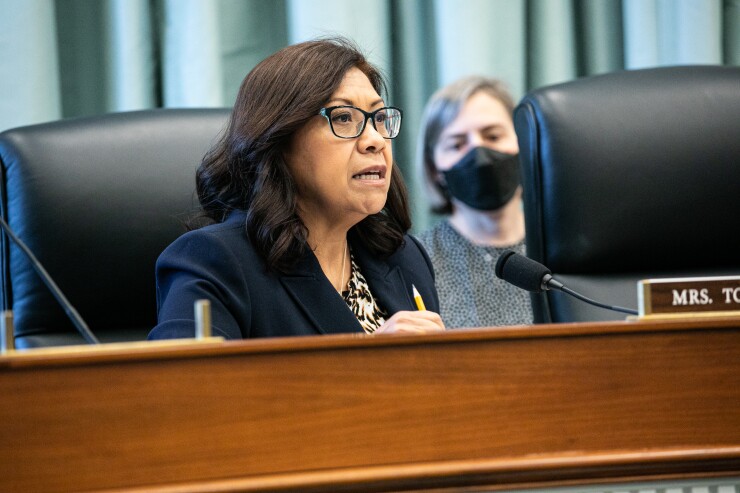A new Congressional proposal would require employers to make direct contributions to workers' retirement savings, regardless of a worker's own contributions.
Introduced by Democratic Reps. Scott Peters and Norma Torres of California, the Saving for the Future Act aims to
Under the measure, companies with 10 or more workers would have to contribute at least 50 cents per hour worked to each employee's retirement account. The minimum would rise to 60 cents after two years and then grow with wages.
Workers at companies with fewer than 10 workers would instead save through federal universal personal, or UP, accounts, modeled on the government's Thrift Savings Plan. These accounts would feature low fees and allow savings to move with workers between jobs.
The first $2,500 saved would go into an UP-Savings account for unexpected expenses — essentially an automated emergency fund — with additional funds directed to an UP-Retirement account. Workers would automatically contribute 4% of their pay, though they could opt out or adjust their rate up to 10%.
"Today's cost of living crisis means most Americans aren't able to put enough money away for retirement or protect their families from unexpected emergency costs," Peters said in a statement. "The Saving for the Future Act would help hardworking Americans build wealth through employer contribution plans. Now more than ever, retirement benefits should follow a worker as they move to new companies throughout their career. This legislation expands proven models of employer-provided savings and invests in portable benefits, so Americans can save for a more secure and prosperous future."
Under the bill, a worker contributing the default 4% of their pay — and receiving only the minimum employer contribution — could accumulate about $750,000 by retirement, according to projections from Third Way, a self-described "center left" think tank based in Washington, D.C. That projection assumes the saver withdraws $800 annually from their UP-Savings account. Without any withdrawals, the balance could grow to over $910,000.
Should a worker opt out of contributing to the fund, the employer's contribution by itself is projected to grow to roughly $250,000 by retirement.
Legislative hurdles on Capitol Hill
The Saving for the Future Act was previously introduced in Congress during the 2019-2020 session, with backing from Democratic U.S. Sens. Chris Coons and Amy Klobuchar, as well as Democratic Reps. Scott Peters, Lucy McBath and Lisa Blunt Rochester.
Despite endorsements from major advocacy groups, including AARP and the National Urban League, the legislation died in committee before a vote. With retirement prospects degrading for many American workers, legislators say passage of the act is critical.
"Nearly a third of workers
Since its introduction, the bill has been referred to the House Ways and Means Committee and the House Education and Workforce Committee. Experts say the Democrat-backed legislation is unlikely to make much progress through a Republican-majority House and Senate.
Still, advisors like Gabriel Shahin, founder of Falcon Wealth Planning in Ontario, California, are hopeful.
"I think there's more momentum now," Shahin said. "A lot of recent legislation has leaned toward strengthening employee benefits and giving working Americans more support. Look at the tax bill earlier this year that permanently expanded deductions and raised the SALT limit to $40,000. The direction is clear: help employees save, reduce future dependence on government programs and promote long-term stability. It's similar to when employers were first required to offer healthcare for certain-sized companies. The same logic is now being applied to retirement."
Who's responsible for retirement savings?
It's taken for granted that workers are responsible for their own retirement savings, but that wasn't always the case. Before defined contribution plans became the default retirement savings vehicle, pensions and other defined benefit plans guaranteed workers a level of financial security in retirement.
The
"It's very clear that we cannot leave Americans entirely on their own to save for retirement, because the proof in the pudding is that they're not doing it," said Byrke Sestok, a financial advisor at MONECO Advisors in Fairfield, Connecticut.
"It was a big governmental failure, in my opinion, when we started having the transition from pensions to 401(k)s," Sestok added. "And it's not necessarily that specific decision that was the problem, but the fact that with that decision, we did not nationally ramp up
Shahin said he has reservations about "the government parenting the population forever," but agreed that many Americans simply lack the ability to consistently save on their own.
"So while it might feel like a push toward socialism, I see it as a necessary step," Shahin said. "If automation helps people build better habits and long-term security, then it's more positive than negative."







